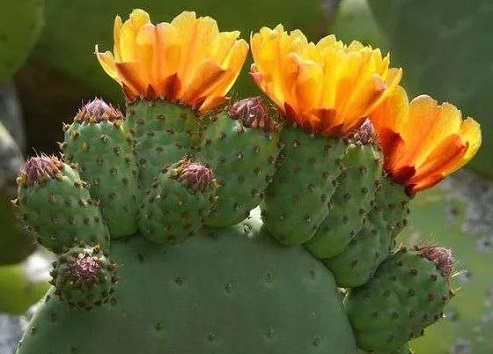Nikhil Prasad Fact checked by:Thailand Medical News Team Jul 26, 2024 9 months, 1 week, 6 days, 23 hours, 19 minutes ago
Herbs And Phytochemicals: Cactus Plant's Hidden Potential
In the vast, arid landscapes where few plants can survive, the cactus stands resilient. Known for its ability to thrive in harsh conditions, this spiky plant might hold secrets to better health, especially for your liver. This
Herbs And Phytochemicals news report explores recent research revealing how cacti, specifically those from the Cactaceae family, could become a natural ally in managing and protecting liver health.
 Brazilian Study Finds That A Desert Plant Could Actually Protect Your Liver
The Study
Brazilian Study Finds That A Desert Plant Could Actually Protect Your Liver
The Study
A group of researchers from the Federal University of Paraíba in Brazil, including Dr Anne Caroline Alves Vieira, Dr Fabrícia de Souza Ferreira, and Dr Januse Míllia Dantas de Araújo, among others, conducted an extensive review on the hepatoprotective properties of cacti. They examined various studies to consolidate findings on how cactus-derived compounds influence liver health. Their review highlights the potential benefits of cacti, particularly the Opuntia species, known for its rich reservoir of antioxidants, polyphenols, flavonoids, and betalains.
Nutritional Goldmine
Cacti are not just ornamental plants; they are nutritional powerhouses. They are packed with dietary fiber, vitamins like A, B, and C, and minerals such as calcium, magnesium, and potassium. These plants also contain a significant amount of natural pigments, terpenes, alkaloids, phenolic compounds, and antioxidants. This nutritional profile makes cacti a valuable addition to diets, especially in regions where they are a staple food.
Liver Health: A Global Concern
Liver diseases, ranging from metabolic dysfunction-associated steatotic liver disease (MASLD) to cirrhosis and hepatocellular carcinoma, are increasing worldwide. The liver is crucial for detoxifying the body, regulating metabolism, and maintaining overall homeostasis. However, it is also highly susceptible to damage from oxidative stress, inflammation, and hepatotoxic agents. The search for effective prevention and treatment strategies has led scientists to explore natural plant sources like cacti.
Key Findings: Antioxidant and Anti-inflammatory Properties
The review by Dr Vieira and her colleagues found that cacti contain several bioactive compounds with antioxidant and anti-inflammatory properties. These compounds help neutralize free radicals, reduce oxidative stress, and mitigate inflammation, all of which are critical in preventing liver damage. Betanin, a betalain found in cacti, plays a significant role in this process. It acts as a powerful antioxidant, reducing lipid peroxidation and protecting liver cells from oxidative damage.
Improving Lipid Metabolism
Cacti also positively influence lipid metabolism. The soluble fiber and polyphenols in cacti help form complex fat molecules, making it harder for the small intestine to absorb fats. This leads to lower blood lipid levels,
which is beneficial for liver health. Additionally, these compounds increase the excretion of lipids through feces, further reducing the fat load on the liver.
Protection Against Hepatotoxic Agents
Studies have shown that cacti can protect against damage induced by various hepatotoxic agents, including certain medications and alcohol. For instance, Opuntia ficus-indica has been found to stabilize hepatic transaminases, reduce apoptosis in liver cells, and preserve normal liver morphology. This protective effect is attributed to the plant's antioxidant and anti-inflammatory properties.
Animal Studies: Promising Results
In animal models, cactus extracts have demonstrated significant hepatoprotective effects. Rats treated with Opuntia ficus-indica showed reduced liver enzyme levels, decreased oxidative stress, and improved liver histology. These findings suggest that cacti could help prevent and treat liver diseases. For example, rats given a diet supplemented with dehydrated nopal (Opuntia ficus-indica) showed a reduction in hepatic lipid droplets, lower hepatic triglycerides, and decreased levels of liver enzymes like ALT and AST.
Clinical Studies: A Need for More Research
While animal studies are promising, human clinical trials are necessary to confirm these benefits. Some preliminary clinical studies have shown that cactus extracts can modulate inflammatory biomarkers and improve lipid profiles in healthy individuals. However, more rigorous trials are needed to establish effective dosing regimens and long-term safety.
Challenges and Future Directions
One of the main challenges in translating these findings to clinical practice is standardizing cactus extracts and determining optimal dosages. Additionally, long-term safety profiles need to be established through well-designed human trials. Despite these challenges, the potential of cacti as a natural remedy for liver diseases is an exciting avenue for future research.
Conclusion: Nature's Gift to Liver Health
Cacti, particularly the Opuntia species, offer a promising natural solution for promoting liver health and managing liver diseases. Their rich content of bioactive compounds provides antioxidant, anti-inflammatory, and lipid-lowering effects, which are crucial for liver protection. While more research is needed to confirm these benefits in humans, the current findings highlight the potential of cacti as a valuable addition to dietary and therapeutic strategies for liver health.
The study findings were published in the peer-reviewed journal: Livers.
https://www.mdpi.com/2673-4389/4/2/21
For the on
Herbs And Phytochemicals, keep on logging to Thailand Medical News.
Read Also:
https://www.thailandmedical.news/news/the-phytochemical-sanguinarine-from-sanguinaria-canadensis-shows-promise-in-fighting-liver-cancer
https://www.thailandmedical.news/news/thailand-medical-scientists-find-that-phytochemicals-from-leaves-of-kaffir-lime-shows-promise-in-treating-liver-fibrosis
https://www.thailandmedical.news/news/herbs-and-phytochemicals-patrinia-villosa-a-promising-protector-against-acute-liver-injury
